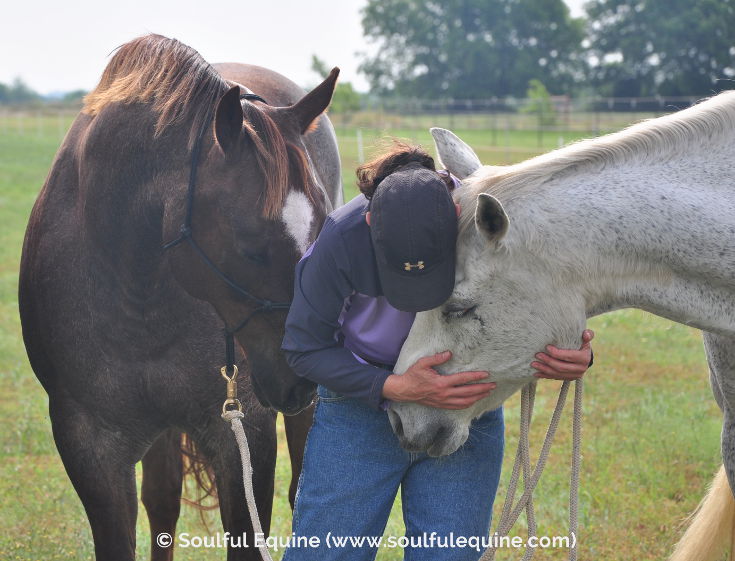
Ransom, Stephanie and Faith
Picture this – you walk out to halter your horse. She doesn’t offer to come to you so you decide to try the “bucket of grain” bribe technique.
As you shake the bucket to make a little noise, your horse looks up, pointing her ears toward you. Then she goes about her business – ignoring you and continuing to eat grass. You think to yourself, “I’ve seen people get their horse to run to them. How come mine won’t do that? I have a bucket of grain. Isn’t that enough?”
As the time passes, you still haven’t caught her (or better yet your horse hasn’t caught you). Frustration and anger build. Every time you approach your horse she runs away.
Why? Your anger becomes more obvious, not only to your equine companion, but to the neighbors who decide to sit on their back porch to watch. When you finally catch your horse, you’re so angry you start to blame her. From there it’s all downhill.
It Shapes Your Relationship
Did you know that a horse can cause you to feel and express every human emotion imaginable? Not only that, but your emotions drive the quality of your relationships. It doesn’t matter what kind of relationship – mother, daughter, son, husband, wife, close friend, co-worker, or your equine partner.
The force that shapes how your horse responds to you – whether negatively or positively – is the force that shapes your relationship with her. That force is emotion. Becoming the person your equine companion needs you to be will result in you learning how to become emotionally fit.
The Meaning of Emotional Fitness
What is emotional fitness? The definition of emotional fitness may be quite different for different people.
To me, it’s about being in present time – in the moment. It’s about not allowing my emotional energy to be used or expressed in a counterproductive manner. When it comes to horses, it’s about your emotions and feelings and how you react to situations that affect your equine companion.
Horses are highly perceptive and easily tune into your intentions and emotions. That’s why developing your emotional fitness not only can keep you safer around horses but can also allow you to deepen your relationship with your equine partner.
The difference between an emotionally fit person and an unfit one is the ability to bounce back quickly from negative emotions.” ~ John Gray, psychologist and author – Known for the book, Men Are from Mars, Women Are from Venus
An Essential Ingredient
Emotional fitness is not optional when you have horses in your life. It’s one of the most critical ingredients of good horsemanship.
The truth, if you have horses in your life, is you’ll become emotionally fit because you have to – it’s a necessity. Those who choose not to will usually sell their horse, become frustrated, resort to abuse at various levels, or get out of horses all together. There’s either no relationship or a disconnected one. Both types result in some form of force versus a willing partnership.
Emotional fitness is about balancing key emotions your equine partner appreciates and needs, which can result in mutual respect, love and, at the same time, responsiveness.
With it you have few issues or “bad horse days” – you’re confident, controlled, and you’re not reactive – rather you’re able to think and access your rational problem solving skills in the most critical of situations.
Without it, you’re not prepared for a multitude of situations that tend to happen with horses – instead, fear takes over, you panic and crumble, which is not good for you or your horse. This type of response can cause your horse to tune into everything else but you, which is not what you want.
What Your Horse Wants and Needs
Have you ever seen the 1998 movie, Six Days Seven Nights?
It stars Harrison Ford, as Quinn , and Anne Heche, as Robin. The gist of the movie is they become stranded on an island in the middle of nowhere. There’s a scene in that movie I love where Quinn becomes frustrated and a little emotionally unstable. Throughout the movie, Ford’s character radiates a confident energy that says, “Follow me, I’ll get you off this island.” Even though he knew more likely the opposite would happen.
There finally came a point where he had a brief emotional breakdown. Robin put her hands on his shoulders, looked him in the eyes and said. “I need you to be my confident captain. I can’t tell you how difficult this is gonna be for me … if you lose it.”
The next time you’re with your horse, think of that movie scene. Your equine partner is no different. She needs her confident, emotionally fit captain.
Put yourself in that same situation. Would you rather feel alone and lost or be with someone like Quinn? Your horse feels the same way.
Here are a few things to consider when it comes to emotional fitness and deepening your relationship with your equine partner:
- Your horse needs you to be impersonal and personal.
- She needs you to be considerate, not pushy.
- She needs you to be loving, not mushy and weak.
- She needs you to be confident and athletic.
- She needs you to be consistent, but add variety at the appropriate time.
- She needs to trust you fully.
- She needs to know beyond a shadow of a doubt that your imbalanced, destructive emotions will not take over a situation.
- She needs you to be part human and part horse – because the human side can prepare her and keep her safe in the human’s environment. The horse side understands her from a horse’s point of view.
You Have to Earn It
To have that close relationship with your horse I know you desire, emotional fitness is required.
Desire doesn’t equal an outcome unless you take action – you have to work on becoming the person your horse needs. Much like the equine in the herd that everyone likes hanging out with. She’s respected and loved but at the same time, other herd members will listen to her, walk by her side, and fully trust her. That didn’t come over night, she earned it!
It’s not about domination, being pushy, being a constant nag, nor is it just all about love.
Emotional fitness doesn’t come over night; it’s a process and is a talent you’ll continue to fine-tune over a lifetime of study with horses. As an added benefit, you’ll enhance the intimacy level in any relationship, especially the one with your equine companion.
As for the person wanting to catch her horse, her horse catches her instead. No need for bribing or chasing her horse around the pasture.
The first step in developing emotional fitness is awareness. Start this week and create a positive habit of observing your level of emotional fitness when you’re around your horse. Don’t change anything, simply observe.
If you’re up for the task, take it a step further and also notice how your horse responds to you and rate your level of emotional fitness ranging from 1 to 10 – 10 being the best.
Keep it soulful,
Stephanie Krahl
